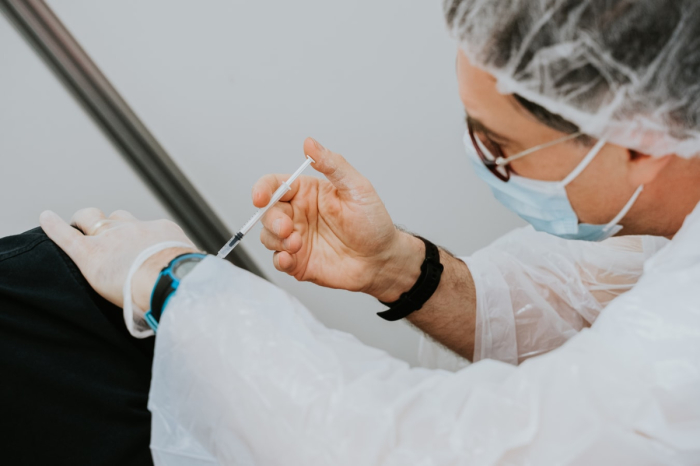Illinois amends religious freedom law to prevent people from skirting vaccine mandates

The governor of Illinois has signed a new law designed to prevent people from using a decades-old religious liberty law to avoid complying with coronavirus vaccine mandates.
Illinois Gov. J.B. Pritzker signed Senate Bill 1169 into law Monday to clarify that the state’s Health Care Right of Conscience Act can’t be used to challenge coronavirus vaccination requirements or other actions taken by employers or businesses to “prevent contraction or transmission of COVID-19.”
In a statement, the Democrat indicated that the measure, which takes effect June 1, is designed to ensure that the law “cannot be abused or misinterpreted to jeopardize workplace safety.”
Pritzker described “masks, vaccines, and testing requirements” as “lifesaving measures that keep our workplaces and communities safe.” He praised the General Assembly for “ensuring that the Health Care Right of Conscience Act is no longer wrongly used against institutions who are putting safety and science first.”
The leadership of the Illinois General Assembly pushed back on the idea that the amended law would make it more difficult for people to claim a religious exemption to vaccine mandates.
“Despite deliberate attempts to misinform the public, nothing about this law takes away anyone’s rights to claim religious or medical exemption, which are protected by federal law,” asserted State House Speaker Chris Welch in a statement shared by the governor’s office.
State Rep. Robyn Gabel, a Democrat, agreed.
“While this law will not take away anyone’s right to claim exemptions based on religious or medical need, it prevents a small group of people from distorting the meaning of the Health Care Right of Consciousness Act and putting some of our most vulnerable members of society in danger,” Gabel said.
The Democrat-controlled Illinois Senate approved the measure by a 31-24 vote on Oct. 28, with six Democrats joining all Republicans in opposing the bill. Four Democrats abstained from the vote.
The Democrat-controlled Illinois House of Representatives passed the bill in a 64-52 vote a day earlier. Seven Democrats joined all Republicans in voting against, and two Democrats abstained from the vote.
The Illinois Health Care Right of Conscience Act, which went into law in 1998. The act requires the state to “respect and protect the right of conscience of all persons who refuse to obtain, receive or accept” particular “health care services and medical care.” The legislation also bars “all forms of discrimination, disqualification, coercion, disability or imposition of liability on such persons or entities by reason of their refusing to act contrary to their conscience or conscientious convictions” by obtaining such medical care.
According to The Chicago Tribune, the Illinois Health Care Right of Conscience Act was initially enacted to protect healthcare professionals from providing abortions against their will.
One frequently cited conscientious objection to the coronavirus vaccine stems from concerns about the use of cell lines derived from aborted fetal tissue in the development of the vaccines.
Others point to concerns about side effects and previous infection with coronavirus as reasons they do not want to receive the vaccine.
Some studies have shown that those previously infected with coronavirus have stronger protection from future infection than those offered by the vaccines. Denmark and Sweden have paused the administration of the Moderna coronavirus vaccine to those younger than 30 due to concerns about the development of heart inflammation among young people. Younger people tend to face less risk of serious illness or death from the coronavirus than the elderly.
According to the Illinois Department of Health, more than 7.7 million Illinois residents are fully vaccinated, accounting for 71.1% of the state’s total population over the age of 12. Data from the U.S. Centers for Disease Control and Prevention shows Illinois has the 21st-highest vaccination rate of the 50 states.
The amendment to the Illinois Health Care Right of Conscience Act comes as the Biden administration’s directive requiring businesses with 100 or more employees to mandate their workers either take the coronavirus vaccine or undergo weekly testing faces legal challenges from private organizations and elected officials at the state level.
The U.S. Court of Appeals for the 5th Circuit temporarily halted the mandate Saturday, citing “grave statutory and constitutional issues” and granted the request of Texas Attorney General Ken Paxton to put the federal mandate on hold.
Coronavirus vaccine mandates issued at the state level have also faced litigation.
Last month, a federal judge in New York ruled that the state’s vaccine mandate for healthcare workers must allow religious exemptions.
While states like Illinois and New York have implemented vaccine mandates for certain employees, other states have taken the opposite approach.
Texas Gov. Greg Abbott, a Republican, issued an executive order proclaiming that no company in the state can mandate that its employees take a coronavirus vaccine. Alabama Gov. Kay Ivey, a Republican, signed an executive order instructing state agencies not to impose penalties on those who decline to take the coronavirus vaccine.
Ryan Foley is a reporter for The Christian Post. He can be reached at: [email protected]



























